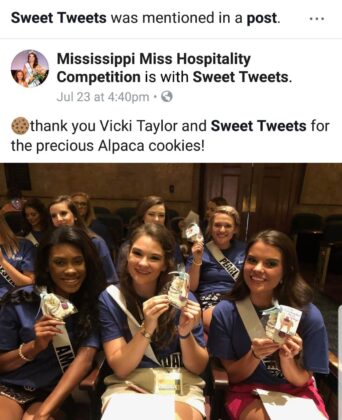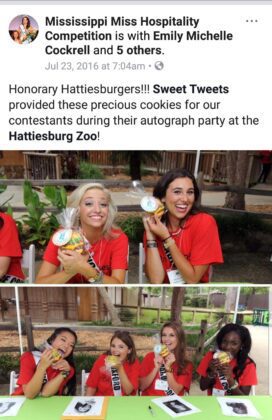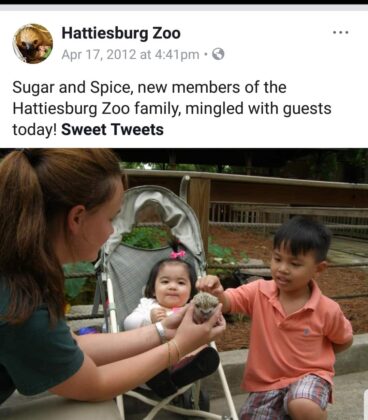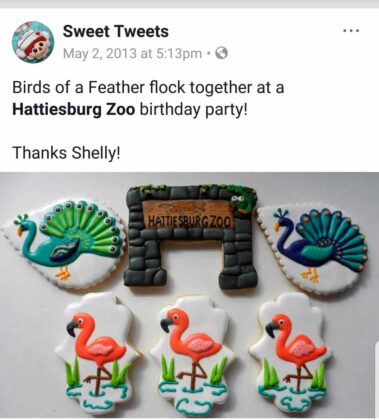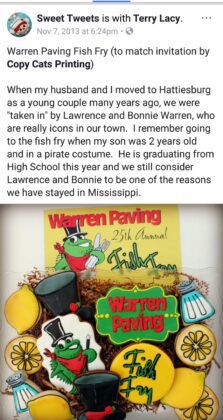
*Correction – Attorney David Ott was incorrectly referenced as the Convention Center attorney. He is the Tourism Commission attorney.
Building a brand is often difficult and expensive, and a coveted part of any brand is its social media presence. Without thousands of dollars in Facebook promotions, marketing tie-ins with established brands, and/or viral marketing, getting a brand off the ground can be next to impossible. Vicki Taylor, wife of Convention Center Director Rick Taylor of Petal, avoided the hardships most brand builders face when she began her cottage food business in 2011, and in only seven years has acquired huge name recognition and an amazing number of followers on Facebook and Instagram. Mrs. Taylor’s recipe for success wasn’t just good cookies, it was also to be hired for taxpayer-funded events and enterprises managed by her husband, Hattiesburg Convention Center Director Rick Taylor, and to coordinate her own marketing efforts with the Convention Center’s publicity machine, which automatically provided enormous boosts to her brand.
Mr.Taylor promoted his wife’s cottage food business on the Facebook Pages of the Hattiesburg Zoo, The Miss Hospitality Pageant, Visit Hattiesburg, the Saenger Theater, the Convention Center, the Jimmy Buffet concert, you name it. He promoted her, and he did so in clear violation of Mississippi ethics and procurement laws, along with the tacit approval of both the Hattiesburg Convention Center Board and Hattiesburg Tourism Commission

From late 2012 until May 2016, Taylor purchased just over $5,900 in cookies from his wife to give to visitors as refreshments in the Visitor center but screenshots from her cookie page indicate she is sending customers to the Visitors Center. Taylor has stated that he recused himself from the purchases, according to a letter from Tourism Commission Center attorney David Ott. However, Taylor’s recusal does not clear him of violating state ethics and procurement laws.
The State Ethics Code begins with statute 25-4-101, which declares that elected and public office and employment is a public trust and that any effort to realize personal gain through official conduct not provided by law violates that trust. The wording of the remainder of this statute is crucial:
“public servants shall endeavor to pursue a course of conduct which will not raise suspicion among the public that they are likely to be engaged in acts that are in violation of this trust and which will not reflect unfavorably upon the state and local governments.”
Rick Taylor has almost certainly violated both the above Statute 25-4-101 and 25-4-105 (1) below:
“No public servant shall use his official position to obtain, or attempt to obtain, pecuniary benefit for himself other than that compensation provided for by law, or to obtain, or attempt to obtain, pecuniary benefit for any relative or any business with which he is associated.”
Attorney Ott, in his letter to the Ethics Commission, points out that Ms. Taylor earned less than $2,500 annually. However, when it comes to conflicts of interest and improper use of office, money is not the only factor to be considered. Below are three key definitions from 25-4-105:
(c) “Business” means any corporation, partnership, sole proprietorship, firm, enterprise, franchise, association, organization, holding company, self- employed individual, joint stock company, receivership, trust or other legal entity or undertaking organized for economic gain, a nonprofit corporation or other such entity, association or organization receiving public funds.
(d) “Business with which he is associated” means any business of which a public servant or his relative is an officer, director, owner, partner, employee or is a holder of more than ten percent (10%) of the fair market value or from which he or his relative derives more than Two Thousand Five Hundred Dollars ($2,500.00) in annual income or over which such public servant or his relative exercises control.
(e) “Compensation” means money or thing of value received, or to be received, from any person for services rendered.

It would appear based on the above statute that a spouse who owns more than 10% (in this case 100%) of the business, cannot receive any government money for sale of the company’s products. Also a pecuniary benefit is not limited to to monies, but would also include non monetary benefits derived from the promotions she received on various social media pages of taxpayer entities under the management of her husband.
Beyond the Ethics Law issues, there appear to be violations with purchasing law. Section 31-7-11 of the Mississippi State Code of 1972 makes it clear that favoritism is not permitted as a purchasing practice.
The Mississippi Procurement Manual devotes an entire chapter to ethics in public contracting, stating “It shall be a breach of ethical standards for any employee to participate directly or indirectly in a procurement when the employee knows that:
(a) The employee or any member of the employee’s immediate family has a financial interest pertaining to the procurement;
(b) A business or organization in which the employee, or any member of the employee’s immediate family, has a financial interest pertaining to the procurement.”
The procurement manual instructs any employee who discovers an actual or potential conflict of interest to
“promptly file a written statement of disqualification and … withdraw from further participation in the transaction.”

It also instructs that said employee may apply to the Ethics Commission for an advisory opinion as to whether the employee may have any further participation in the transaction.
According to Mr. Ott, Rick Taylor took neither of these required steps.
The Hattiesburg Patriot News Media’s investigation also revealed that Mr. Taylor’s wife, a talented cookie artisan, has a home kitchen-based business known as a Cottage Food business. Under Mississippi Law, cottage food businesses are allowed to sell only to the end consumer at markets approved by DOAH (Department of Animal Husbandry). Also, cottage food businesses are prohibited from soliciting sales online, including social media, and they cannot sell wholesale or in retail establishments. The law reads,
“(2) A cottage food operation may not sell or offer for sale cottage food products over the Internet, by mail order, or at wholesale or to a retail establishment.”
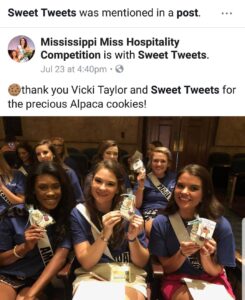
Directly or indirectly, Rick Taylor shamelessly promoted his wife’s cookie business using taxpayer entities. His wife, in turn, promoted those same events on her business site.
Tourism Commission Attorney, Mr. Ott, maintains that Ms. Taylor earned negligible amounts, a mere 37 cents per cookie in connection with the $5900 in cookies purchased by the Visitors Center for “Refreshments”. Ott admits, however, that Ms. Taylor cannot document all of her sales. Unfortunately for her and for taxpayers, one of the requirements for being a cottage food operation is that written documentation of annual sales be kept. Section 1b of the Cottage Food Production Operations Law reads: ” A cottage food operation must provide the department, upon request, with written documentation to verify the operation’s annual gross sales.”

Mr. Ott does document Ms. Taylor’s sales to the Tourism Commission. Her only sale in 2012 was November 11, for $142. In 2013, she earned $1,793 in cookie sales. In 2014, she earned $1,432 from the sale of cookies to the Tourism Commission and $404.79 in outside sales. By 2015, outside sales jumped dramatically; Ms. Taylor earned $1,777.00 in sales to the Tourism Commission and $1,923.00 to others. In 2016, Ms. Taylor posted sales of $770.00 to the Tourism Commission and $1,312.00 in outside sales; her last transaction with the Tourism Commission was in May of 2016.
Ms. Taylor was paid from the Tourism Commission’s petty cash fund. Responses to public records requests from the Hattiesburg Patriot indicate that no W-9 was filed for her, meaning presumably that she in turn did not file taxes on these payments. Ms. Taylor also advertises her business as a charity, and attorney Ott states that she makes it her practice to donate all profits to local charities. The Hattiesburg Patriot has not found a listing for her business as a charity or a non-profit with the Secretary of State, however.

The figures provided by the Tourism Commission attorney indicate that since 2012, Ms. Taylor has enjoyed a steady growth in sales, both with the Tourism Commission and with outside sales. This growth in sales dovetails with the growing popularity of her business and the success of her brand on social media. The Hattiesburg Patriot contends that she could not have achieved this level of success as quickly as she did without the assistance she received from her husband’s improper use of his office.
And that’s how the cookie crumbles…
Hattiesburg Patriot News Media is funded by people who want to support a local watchdog in the Pine Belt. These investigations take time and money. Patriot-Plus members have access to audios of legal proceedings, court transcripts, legal documents, and audio podcasts involving the corruption published here.
Below are some of the screenshots obtained while investigation this misuse of taxpayer money and resources.



